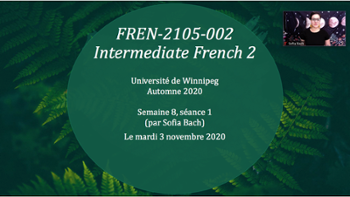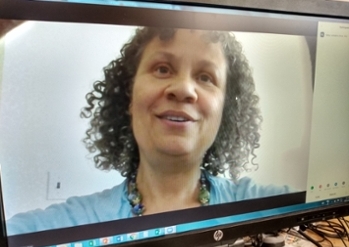Arts departments pivot to online (Part 2) - language teaching
Mon. Mar. 16, 2020

Modern Languages and Literatures (MLL) corridor in Fall 2020
This is the second part of our feature "Arts departments pivot to online - MLL," which looked at how instructors in the Department of Modern Languages and Literatures (MLL) are navigating the change to remote teaching for Fall 2020 due to COVID. What we found was largely positive. Instructors are adapting their teaching using a mix of Zoom sessions for in-person contact and Nexus for activities to support learning.
Instructors identified some challenges such as technical issues, which were problematic especially in the early days. Some noted that, while remote teaching for content courses is practicable, there are clear challenges for teaching language courses remotely. As Dr. Samantha Cook, Assistant Professor in the French Studies Program, put it, "To be effective language learning requires active participation."
For this reason, we have elected to go back to the instructors in MLL, specifically those who teach language courses, and find out what resources they recommend for teaching language courses online. We hear from three instructors in the French Language Program: Sofia Bach, Mary LeMaître, and Melanie Souresseau.
And, as you'll see, we go one step further and invite language instructors from other departments in the Faculty of Arts to similarly contribute.
French language resources
Sofia Bach
CAS Instructor
Recommended resources: Kahoot, Mentimeter, and Quizlet

photo supplied
This screenshot includes Sofia Bach (top right) and features her course, FREN-2105-002 Intermediate French 2.
I have been using Kahoot and Mentimeter to include some interactive quizzes to my online Intermediate French lessons. I find that these tools help in keeping the students engaged in the virtual classroom and are a handy substitute to games and group work I would normally include in the physical classes. With the free account option, Kahoot allows access to have multiple choice questions and true/false questions only.
Mentimeter, which is more commonly a tool for presentations, allows the option to quizz the participants with the short answers option as well. However, it restricts the number of questions per presentation to just 10.
Quizlet is an online tool that I have just recently (re)discovered. It allows to create online sets of flashcards with answers on the one side and explanations/questions on the other. It also offers the option to test the knowledge learned from each set by automatically creating a quiz based on the information in the set. I find it very useful as an extra resource for helping the students study new vocabulary and review the verb conjugations.
Dr. Mary LeMaître
Instructor
Recommended resources: Kahoot, teaching options in Nexus

photo supplied
Dr. Mary LeMaître as she appears to her students in videos for her online courses.
I like to use Kahoot. You can get it for free to create multiple choice or true or false quizzes. Game show type music plays while students are doing the quiz. And there’s a timer you can set to decide how much time you want to give students to answer each question. As well, you can add a picture to the background of each question. There are other options in terms of question types, but you must upgrade to Premium.
I am also really enjoying all the Nexus teaching options there are to discover! My favorite new section is "Assessments". It is great for giving homework and tests! The two headings under “Assessments” that I use are: “Assignments” and “Quiz”
I post homework in "Assignments". Students can access it and submit their work at any time. You can see at a glance who has submitted their homework and when. Feedback is very easily provided by highlighting parts of their work and leaving comments in the side column. The student simply resubmit the assignment with corrections.
Under "Quiz" you can make a typical test with many question styles as options. Questions can be moved around, deleted, copied, etc. as you are creating the quiz. Tip: When it asks for the percentage value of each question, divide 100 by the number of questions. The total value is entered by you at the top of the page. For more
Mélanie Sourisseau
CAS Instructor and TA
Recommended resources: online libraries

photo supplied
Photo credit: Rachel Berg
There are two online libraries that could be an alternative for anyone wishing to read in French. The SNCF's library is quite diverse, whereas TV5MONDE's is literary in its selection. Please note that, to read on the SNCF site, it is necessary to create an account.
Recommendations for other languages
The French Language Program is one of many language programs at UWinnipeg. In Modern Languages and Literatures, students can also study in the (i) German Studies Program, (ii) Italian Studies, and (iii) Spanish Studies. As well, some years Introduction to Portuguese is offered.
Language instruction is also offered in the Departments of Classics, Indigenous Studies, and Religion and Culture/East Asian Languages and Cultures.
We invite input from instructors in these other language classes to contribute to our list of resources. Ultimately, we hope to build a resource that we can make available to help others as they start out or transition their teaching to online.
To be included, simply contact me, Lisa McLean by e-mail at l.mclean@uwinnipeg.ca with the following information:
Your name:
Teaching area:
Recommended reference or resource:
Statement about that resource: e.g., I found Kahoot useful for . . . , but one limitation with it is that . . .
See also:
Arts departments pivot to online (Part 1) - MLL
